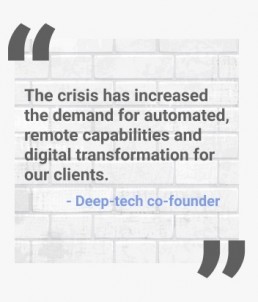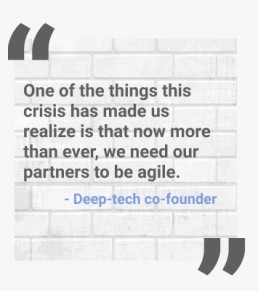The start-up economy generates $3 trillion worldwide, and there are 500 unicorns (i.e., start-ups worth more than $1 billion) across the globe. With 100 of these unicorns based in Europe, the continent is undoubtedly one of the most promising start-up and scale-up ecosystems in the world. Europe houses a third of the world’s leading start-up cities, including well-known start-up hubs such as London, Berlin, Amsterdam, and Paris. There are also many nascent ecosystems emerging in other cities (e.g., Stockholm, Helsinki, Lisbon, and Milan) that are showing significant promise. Europe is home to some of the leading companies in fintech (Monzo, Starling, and Revolut), AI (Graphcore and Shift Technology), digital health (Babylon, Sidekick Health, and Alan), blockchain (Everledger and Provenance), and cloud-native ecosystems.
Start-ups and scale-ups have been hit hard by the economic impact of COVID-19. With a smaller customer base than large companies and less cash on hand to cover expenses, they are more susceptible to economic shocks than large companies. However, they can quickly adapt to changing market dynamics by iterating on existing products, shifting monetization strategies, or exploring new markets.
We reached out to a sample of European start-ups and scale-ups over the last couple of weeks to truly understand the impacts of the COVID-19 crisis and here’s what we found out.

The Limits of Government Support
While there has been unprecedented government support in Europe during this pandemic, most are geared toward immediate relief for challenges relating to cash flow, staffing, and rental costs rather than innovation. However, some of our respondents were ineligible for the support they required (e.g., they needed to have secured external funding before, or had not been operating for long enough in relevant geographies) or incurred significant delays in getting access to the support they were entitled to. These challenges were further compounded for those that were operating across multiple geographies, as they needed to understand the relevant support schemes of the countries they operated in. A deep-tech CEO mentioned that furlough schemes could have been more flexible in allowing some to work full time, as the schemes created a “lack of talent utilization,” with many hiring highly skilled professionals for roles in which there is more demand than supply.
Though government support schemes aim to keep companies afloat in the early months of 2020, even vendors and partners have crucial roles to play. Many start-ups we interviewed had not received support outside of government support schemes.


(this information was compiled from qualitative interviews with a sample of start-ups and scale-ups)
A Hybrid Approach to Remote Work
Most had shifted to remote working without severe impacts to the day-to-day of their businesses. Some had not allowed remote working pre-COVID-19, though they could now see the merits of a hybrid approach that allows flexibility for staff in this new normal. One founder even went as far as stating that: “pre-lockdown we had been building product remotely, then looking for offices in December and now not going to look for offices.” Some — particularly those in the early phases of developing their businesses — will look to work remotely as much as possible to avoid unnecessary costs on rent and transport.
Investor Trepidation
As soon as COVID-19 began to spread globally, investors became much more focused on the impact of the crisis on their portfolio companies, rather than on investing in new start-ups. With many start-ups/scale-ups (even the well-funded ones) having under three months of runway in reserve, investment has become a thorny issue for many. The start-ups and scale-ups we spoke with were no different, as several were on track to raise funds pre-crisis, but have since been unable to.
What Next?
Start-ups are at the forefront of creating products and services that disrupt whole industries. They create net new jobs, bring to light new skills that become instrumental to tech overall, and generate unparalleled gains for the economy (Start-up Genome revealed the start-up economy is growing over 10 percent per year, about three to four times faster than the rest of our economies).
IDC views the start-up and scale-up ecosystem as beyond simple innovators — hence, to explore the interplay of start-ups/scale-ups, incubators, accelerators, enterprise vendors, and the investment community, we have launched IDC’s Tech Start-up & Scale-up Exchange, a networking community for tech start-ups and scale-ups to connect, exchange advice, seek partnering opportunities, and help each other make smarter business decisions for short- and long-term growth. Join Now!
